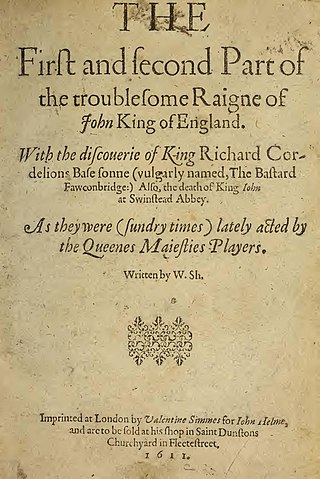
George Chapman was an English dramatist, translator and poet. He was a classical scholar whose work shows the influence of Stoicism. William Minto speculated that Chapman is the unnamed Rival Poet of Shakespeare's sonnets. Chapman is seen as an anticipator of the metaphysical poets of the 17th century. He is best remembered for his translations of Homer's Iliad and Odyssey, and the Homeric Batrachomyomachia.
Rollo Duke of Normandy, also known as The Bloody Brother, is a play written in collaboration by John Fletcher, Philip Massinger, Ben Jonson and George Chapman. The title character is the historical Viking duke of Normandy, Rollo. Scholars have disputed almost everything about the play; but it was probably written sometime in the 1612–24 era and later revised, perhaps in 1630 or after. In addition to the four writers cited above, the names of Nathan Field and Robert Daborne have been connected with the play by individual scholars.

Thomas Lord Cromwell is an Elizabethan history play, depicting the life of Thomas Cromwell, 1st Earl of Essex, the minister of King Henry VIII of England.

Locrine is an Elizabethan play depicting the legendary Trojan founders of the nation of England and of Troynovant (London). The play presents a cluster of complex and unresolved problems for scholars of English Renaissance theatre.

A Yorkshire Tragedy is an early Jacobean era stage play, a domestic tragedy printed in 1608. The play was originally assigned to William Shakespeare, though the modern critical consensus rejects this attribution, favouring Thomas Middleton.

The Merry Devil of Edmonton is an Elizabethan-era stage play; a comedy about a magician, Peter Fabell, nicknamed the Merry Devil. It was at one point attributed to William Shakespeare, but is now considered part of the Shakespeare Apocrypha.
Fair Em, the Miller's Daughter of Manchester, is an Elizabethan-era stage play, a comedy written c. 1590. It was bound together with Mucedorus and The Merry Devil of Edmonton in a volume labelled "Shakespeare. Vol. I" in the library of Charles II. Though scholarly opinion generally does not accept the attribution to William Shakespeare, there are a few who believe they see Shakespeare's hand in this play.

The Troublesome Reign of John, King of England, commonly called The Troublesome Reign of King John is an Elizabethan history play, probably by George Peele, that is generally accepted by scholars as the source and model that William Shakespeare employed for his own King John.

Blurt, Master Constable, or the Spaniards' Night Walk is a late Elizabethan comedy, printed anonymously in 1602 and usually attributed to either Thomas Middleton or Thomas Dekker.
Lust's Dominion, or The Lascivious Queen is an English Renaissance stage play, a tragedy written perhaps around 1600, probably by Thomas Dekker in collaboration with others and first published in 1657.

Poetaster is a late Elizabethan satirical comedy written by Ben Jonson that was first performed in 1601. The play formed one element in the back-and-forth exchange between Jonson and his rivals John Marston and Thomas Dekker in the so-called Poetomachia or War of the Theatres of 1599–1601.
The Case is Altered is an early comedy by Ben Jonson. First published in 1609, the play presents a range of problems for scholars attempting to understand its place in Jonson's canon of works.
Cupid's Revenge is a Jacobean tragedy written by Francis Beaumont and John Fletcher. It was a popular success that influenced subsequent works by other authors.

The Coronation Triumph is a Jacobean era literary work, usually classed as an "entertainment", written by Ben Jonson for the coronation of King James I and performed on 15 March 1604. The event was postponed due to plague in London.
The Beaumont and Fletcher folios are two large folio collections of the stage plays of John Fletcher and his collaborators. The first was issued in 1647, and the second in 1679. The two collections were important in preserving many works of English Renaissance drama.
Caesar and Pompey is a Jacobean era stage play, a classical tragedy written by George Chapman. Arguably Chapman's most obscure play, it is also one of the more problematic works of English Renaissance Drama.
Thomas Creede was a printer of the Elizabethan and Jacobean eras, rated as "one of the best of his time." Based in London, he conducted his business under the sign of the Catherine Wheel in Thames Street from 1593 to 1600, and under the sign of the Eagle and Child in the Old Exchange from 1600 to 1617. Creede is best known for printing editions of works in English Renaissance drama, especially for ten editions of six Shakespearean plays and three works in the Shakespeare Apocrypha.

Thomas Pavier was a London publisher and bookseller of the early seventeenth century. His complex involvement in the publication of early editions of some of Shakespeare's plays, as well as plays of the Shakespeare Apocrypha, has left him with a "dubious reputation."

The True Tragedy of Richard III is an anonymous Elizabethan history play on the subject of Richard III of England. It has attracted the attention of scholars of English Renaissance drama principally for the question of its relationship with William Shakespeare's Richard III.
Egerton MS 1994 is a manuscript collection of English Renaissance plays, now in the Egerton Collection of the British Library. Probably prepared by the actor William Cartwright around 1642, and later presented by him to Dulwich College, the collection contains unique copies of several Elizabethan, Jacobean, and Caroline dramas, including significant works like Edmund Ironside and Thomas of Woodstock.











